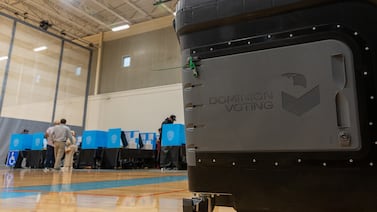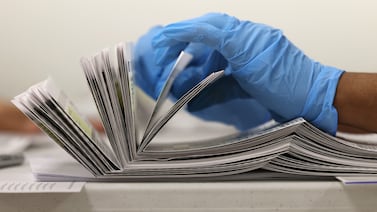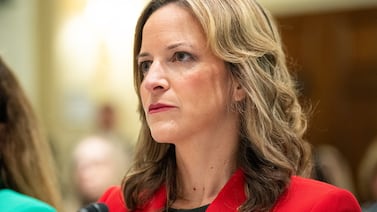Votebeat is a nonprofit news organization reporting on voting access and election administration across the U.S. Sign up for Votebeat Wisconsin’s free newsletter here.
When Madison residents went to vote in a special election this month, they didn’t have to stand in line according to their last name or wait for poll workers to flip through paper lists to find their names. For the first time, election officials there used electronic pollbooks to check voters in, allowing them to search for voters’ names and collect signatures on digital pads.
They could also use the e-pollbooks to process absentee ballots, register new voters, and issue voter numbers, just as they did with paper poll books, but with less chance of error.
The pilot program in the state capital offered a glimpse of both the technology’s potential — and its current limitations. Poll workers praised the state’s in-house e-pollbook system, known as Badger Book, for its speed and accuracy. But its high costs, limited vendor options, and a lack of state funding for support staff have stalled broader adoption, especially in large cities.
Now, with the Wisconsin Elections Commission beginning to evaluate commercial e-pollbook vendors, clerks are hoping new options might offer a more sustainable path forward.
Deploying the state’s system in a city as large as Madison is “just not practical at this point,” Mike Haas, Madison’s interim clerk, said after the June 17 county supervisor election. “We looked at it more as an opportunity to get familiar with the technology.”
Funding is just one challenge. Adopting the e-pollbook in a city like Madison could cost well over $1 million. While the software is free, the hardware for running it — including a tablet-like device and a printer — costs well over $2,000 for each station, and each of the city’s 120 polling locations would each likely need several. Milwaukee, with over 180 sites, would face even higher costs. And in small, cash-strapped towns, setting aside even $10,000 for e-pollbooks can be unrealistic.
Another challenge is access to support. Badger Book is the only approved e-pollbook in the state, and it’s designed and maintained by the Wisconsin Elections Commission.
While any municipality can use it, commission staffers would likely be limited in their ability to provide Election Day support for a city as big as Madison or Milwaukee, unless they got more funding from the Legislature.
Larger jurisdictions using Badger Book would have to manage some of the logistics and troubleshooting on their own, said Ann Jacobs, a Democratic appointee and current chair of the Wisconsin Elections Commission.
“I would love it if we could have the staff sufficient to have a little Badger Book division and be able to service Badger Books statewide,” she said. “That would be terrific. That’s not our current reality.”
Sun Prairie confronts the costs of an upgrade
Sun Prairie, northeast of Madison, was the first municipality in Wisconsin to adopt the e-pollbook after the technology rolled out in 2018. Now around 400 out of the state’s 1,850 municipalities use it. It’s an excellent tool that saves hours of staff time, said Sun Prairie Clerk Elena Hilby, but the city’s hardware is aging and beginning to slow down, and as long as Badger Book is the only system available, she worries about the cost of updating it.
Currently, only one company in Wisconsin — PDS, A Converge Company, which is based in Oconomowoc — is authorized to replace the hardware used to operate the e-pollbooks.
When Hilby asked the company for a quote on a machine in January, the cost was $2,011, she said. In April, she said, it was $2,441, an increase that the company attributed to tariffs.
“We are literally fish in a barrel,” Hilby said. “They can make it cost whatever they want, and we’re stuck, because they’re the only ones we can use.”
And she doesn’t want the Badger Books the way they are. “I want WEC to give me other options,” she said.
Commercial alternatives may not be much cheaper, said Ben Adida, founder and executive director of election technology vendor VotingWorks. And either way, the investment can be worth it, Adida said, because e-pollbooks reduce staff time. That’s especially true at the end of the night when poll workers upload voter data, a task that’s “incredibly tedious” without e-pollbooks, he said.
One advantage of an in-house system is that it can be tailored to a particular state or jurisdiction, said Tammy Patrick, chief programs officer for the Election Center, a nonprofit group representing election officials. Commercial products start off with a basic menu of services, and customizing them can require more time and money, she said.
The disadvantage is that the extent of state support depends on government funding. Commercial options can fluctuate in their ability to support clients, she said, but they aren’t as “susceptible to the whims of legislators and appropriators.”
Commercial alternatives could be coming
The Wisconsin Elections Commission is looking at how to give local election officials access to more options and support.
On May 2, the commission invited clerks to join a committee to evaluate commercial e-pollbook options, working with vendors and the general public. The topic is likely to be discussed at the commission’s July meeting. The commission “looks forward to addressing the committee’s feedback,” said WEC Administrator Meagan Wolfe.
The committee won’t assess Badger Books, according to the email sent to clerks, and its work “does not mean that Badger Books will be discontinued.” Other states, the email noted, have multiple approved pollbook models.
The Wisconsin Municipal Clerks Association and Wisconsin County Clerks Association have also formed a task force on the future of e-pollbooks, said Hilby, who’s co-leading the group with Portage County Clerk Maria Davis. They aim to compile a list of clerk concerns and expectations by July.
Can commercial options match Badger Book on security?
Forty states had at least one jurisdiction that used e-pollbooks in the 2022 general election. Wisconsin, Michigan, and Colorado use e-pollbooks developed in-house. Other states, like Alabama and Florida, have multiple commercial options. Some states just use one commercial vendor.
Jacobs, the election commission chair, said an advantage of Badger Book is that the commission has access and control over the product, which makes it more secure. It never connects to the internet, unlike many of the added features in commercial products that clerks have said they’d like to have, she said.
“I’m skeptical that a commercial product, especially those that connect to the internet, would be of sufficient security and usability for us to allow for them to be used within our system,” she said.
Haas, Madison’s interim clerk and the former Wisconsin Elections Commission administrator, said the commission also opted for an in-house system because the state’s elections are decentralized and have unique laws. The initial idea, he said, was to see how the in-house system works before considering whether private vendors could move into the market.
While the pilot project worked out, he said, Madison is unlikely to implement e-pollbooks anytime soon. In the long term, he said, the decision will depend on whether the city council wants to pay for it, and whether the election commission can provide enough support.
“Based on what I’ve heard from the staff in working with the technology, I think they would be happy to be able to implement it,” Haas said.
Alexander Shur is a reporter for Votebeat based in Wisconsin. Contact Alexander at ashur@votebeat.org.



